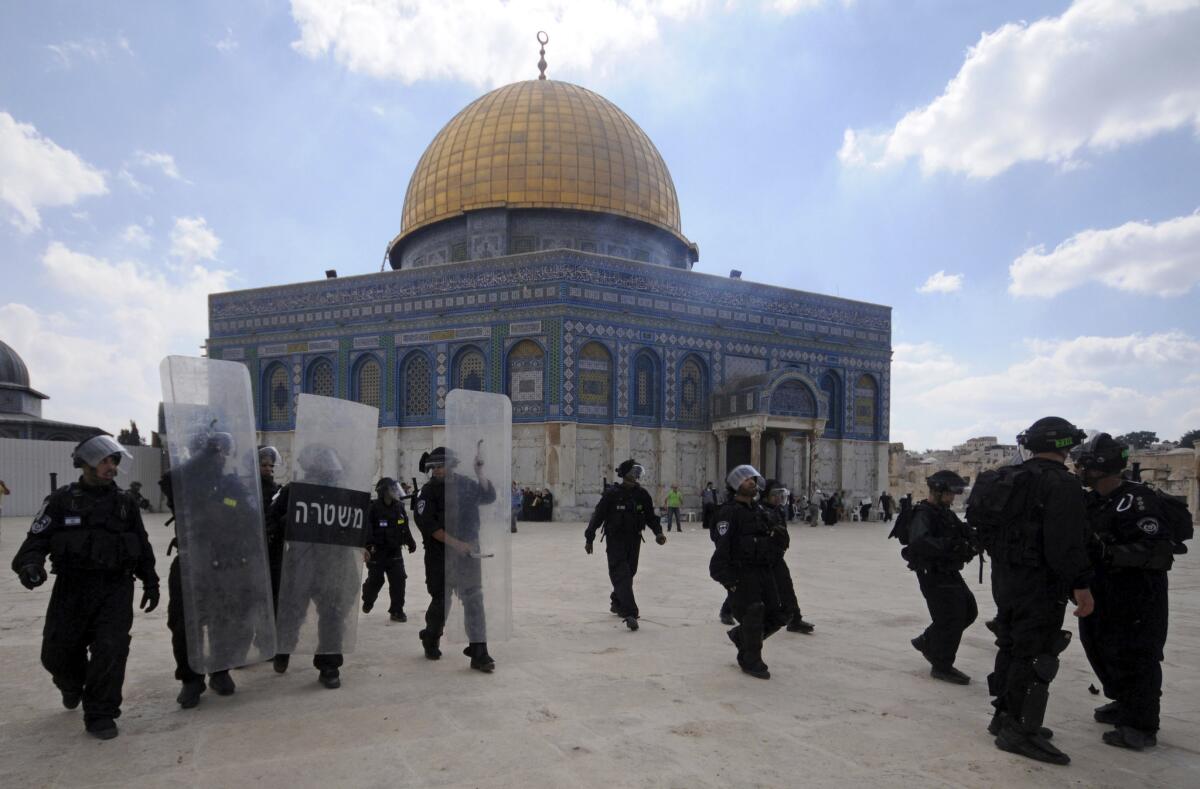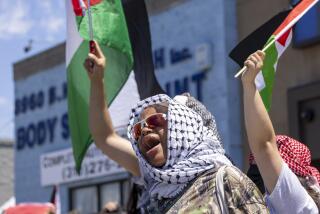He’s Jewish, she’s Muslim, and they may be heading toward a showdown over Jerusalem’s holiest site

In this Oct. 5, 2012, file photo, Israeli forces take position during clashes with Palestinian worshippers at the Al Aqsa Mosque compound in Jerusalem’s Old City.
- Share via
Reporting from Jerusalem — They are activists on rival sides in the struggle for the plaza that is Jerusalem’s holiest and most contested spot. Madeline Issa calls it Al Aqsa Mosque. Rabbi Yakov Idels calls it the Temple Mount.
Both have been scarred by events at the contested Old City esplanade, but their devotion to the place keeps them coming back. Now, with the onset of the Jewish holiday of Passover, officials worry that religious pilgrims like Issa and Idels could spark a new, religiously inspired conflict in Jerusalem.
Issa is a 23-year-old Islamic activist who had been visiting the Al Aqsa Mosque compound daily before police started banning her last September for harassing Jewish visitors. Now, she brings busloads of Muslim pilgrims to the mosque and risks new arrest by slipping past police incognito just to be at the third holiest site in Islam.
Last week, short of breath and anxious, she donned a colorful head scarf and large sunglasses as she made her way through a narrow Old City alley toward the Israeli police post at the entrance to the plaza that flanks the gold-domed mosque. She described an almost compulsive need to keep visiting.
“I want to enjoy the breeze of Al Aqsa. I want to fill my body with Al Aqsa before they ban me permanently,” she said.
Idels is a 46-year-old rabbi who also feels a spiritual pull to the holy site. For him, the plaza is Judaism’s holiest spot: the location of the ancient Jewish Temple destroyed 2,000 years ago. A month after Issa’s ban, Idels watched Israeli police arrest his teenage son for swaying in meditation — a violation of rules that ban non-Muslim visitors from praying at the plaza.
“The Temple Mount is a sort of a wound. It’s a place where every time you touch it, it’s sensitive,” said Idels, sitting opposite bookshelves lined with traditional texts in his house in the West Bank settlement of Bracha (Hebrew for “Blessing”). “That Temple is supposed to be the place where peace comes from. And today it’s the opposite. It’s the place where fighting erupts.”
See more of our top stories on Facebook >>
As Idels readies to return to the plaza with a tour group for Passover, which begins at sundown Friday, authorities are bracing for the possibility that this year will see a repeat of the fall holiday season, when the religious turf war at the Old City plaza boiled over into clashes, arrests and police restrictions — and ultimately sparked a six-month wave of Palestinian knife attacks that spread from Jerusalem to the West Bank. Though Jerusalem has since calmed, many people see the relative stability as fragile.
Passover is one of three Jewish holidays that used to involve a pilgrimage to the ancient Jewish temple for offerings.
When Israel captured East Jerusalem from Jordan in the 1967 Arab-Israeli war, it left a Jordanian religious organization in charge of the holy sites on the plaza. It also left in place a centuries old Jewish religious ban, accepted by the majority of the rabbinic establishment at the time, on renewing ritual at the plaza or rebuilding the temple.
The ancient Temple’s retaining wall, known as the Western Wall, was tapped as the main site for Jewish ritual.
But in recent years, a growing group of Israelis like Idels have been lobbying the government to assert more sovereignty and allow prayer on the plaza. After disturbances last year, a series of understandings between Israel and Jordan succeeded in reestablishing stability by keeping provocateurs from the plaza and avoiding age and gender restrictions on Muslim worshipers, according to a report on the plaza by the International Crisis Group.
Muslims “still view the very access of many religious Jews on a Jewish holiday as a threat,” said International Crisis Group analyst Ofer Zalzberg. “They fear that it strengthens the Jewish claims” to ownership of the site, and it would crimp Muslims’ access.
Last week, amid rising tension, Prime Minister Benjamin Netanyahu warned of an effort by “extremists” to foment riots by spreading “lies” about Israeli plans to allow Jewish ritual at the plaza and crimp Muslim worship. In a public message to the Palestinians and Jordan, he insisted that Israeli policy hadn’t changed. Israeli police will deploy reinforcements in Jerusalem and also ban Israeli politicians from visiting the plaza during the holiday.
The Temple Mount, Al Aqsa Mosque and the Western Wall have been notorious as a focus of religious and nationalist acrimony for decades. In 1929, rumors that Jews were bent on taking control of the mosque sparked rioting that killed hundreds. A visit to the Jerusalem plaza in 2000 by Israeli leader Ariel Sharon, the future prime minister, triggered protests that eventually became the second Palestinian intifada, or uprising.
In recent years, amid the rise in visits of Jewish pilgrims to the plaza, Islamic groups have rallied activists to pray, study and assert their presence. Some of those activists used rocks and fireworks in violent clashes with Israeli police.
Issa, a Palestinian citizen of Israel, said she has answered the call by visiting the site daily and organizing buses of pilgrims from her home village of Kafr Qassem, an Israeli Arab community northeast of Tel Aviv. “They say it’s their Temple Mount, but it’s for me and other Muslims.”
An activist with a branch of the Islamic Movement in Israel, an offshoot of Egypt’s Muslim Brotherhood, she is known as a murabitat, one of a group of women who go to the holy plaza to both pray and confront religious Jewish visitors, yelling “Allahu akbar!” -- God is great -- and sometimes even spitting in their direction.
Before the Jewish New Uear holiday last fall, Israel banned murabitat from the plaza. The Islamic Movement in Israel was outlawed. Now, Israeli police easily recognize Issa, in her plain white hijab, and turn her away.
“It was very painful,” she said, her eyes momentarily welled with tears as she recounted the first time the police blocked her from the plaza last September. “It choked me.”
Some former Israeli security chiefs blame Jewish activists for the tension and violence at the holy site. Idels, however, contended that the problem lies with activists such as Issa. He said the plaza should be a place of peace and interreligious “connection,” but that it should also be a place where Jews can come to pray.
“Going up to the mount isn’t supposed to injure anyone else. It’s not to provoke. It comes from a place of the rights we have to this [place],’’ he said. Other Temple Mount activists openly fantasize about razing the Al Aqsa Mosque and the Dome of the Rock Muslim shrine on the plaza and rebuilding the ancient Temple, which Idels acknowledged was “impossible.”
Among the shelves of religious texts in his modest salon, Idels keeps a signed copy of a book on the Temple Mount by Rabbi Shlomo Goren, a mentor who was one of the first rabbis to argue for a new temple to be built and for Jewish prayer at the plaza — flouting the ban by the rabbinic establishment on Jewish ritual there. Goren’s teaching on the Temple Mount “was very meaningful in my life,’’ Idels said.
On the eastern side of the plaza, opposite the golden Dome of the Rock, a Muslim shrine — the site of the ancient Jewish Temple — Idels has a spot where he often pauses to meditate, praying for the Jewish people, for peace and for his family. That is where, in October, his teenage son went too far, closing his eyes and swaying.
“The police immediately jumped on him and took him away for a half-day, like the lowest criminal. I felt humiliated and helpless,’’ he said. “It’s a terrible feeling of disgrace to stand in a place that belongs to you, the holiest place, and there’s a prayer ban. ... When the Arabs come and claim that our prayer injures them, it’s their problem.”
Issa said she’s convinced the tensions in Jerusalem are an excuse to ban Muslim faithful like herself, but she says it’s impossible for her stay away. “Al Aqsa is my soul, and I feel that my death will take place there,’’ she said.
Back in the Old City alleyway, the murabitat put the finishing touches on her disguise, and advanced toward the gate to the holy plaza. The silhouettes of Israeli police guards at the gate were visible just a few hundred feet away.
“I don’t feel good,’’ she admitted. “But God will protect me.”
Mitnick is a special correspondent.
ALSO
9/11 attacks reemerge as a critical test of U.S.-Saudi relationship
U.S. faces an uphill effort in helping build an Iraqi force that can retake Mosul
6-year-old Afghan girl’s murder puts spotlight on history of discrimination and abuse in Iran
More to Read
Sign up for Essential California
The most important California stories and recommendations in your inbox every morning.
You may occasionally receive promotional content from the Los Angeles Times.










